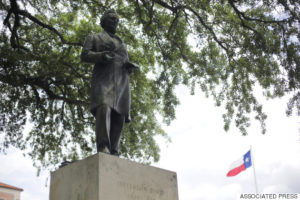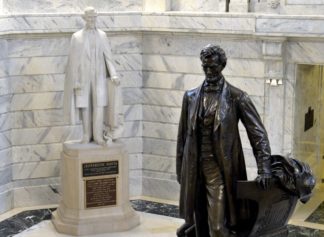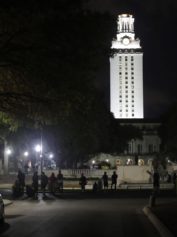
A statue of Jefferson Davis is seen on the University of Texas campus, Tuesday, May 5, 2015, in Austin, Texas. The University of Texas student government passed a resolution recently to remove the statue of Jefferson Davis from a prominent space on the university campus. (AP Photo/Eric Gay)
All across the globe, students have made it clear that they no longer want memorials, buildings or bridges dedicated to honoring their countries dark past and racist roots. The latest group of students to take a stand against such monuments belongs to a Texas university that displays a large statue of Jefferson Davis, the president of the Confederacy.
Students at the University of Texas have joined together to insist that the school remove the statue honoring Davis from its campus in Austin as another unidentified party has vandalized that very same statue.
It’s a clear sign that the students don’t feel comfortable knowing the college campus still seems to be flaunting the state’s Confederate history.
“We thought, there are those old ties to slavery and some would find it offensive,” senior Jamie Nalley told The Huffington Post.
A vast majority of the school’s student government agreed with those sentiments and has adopted a resolution to have the statue removed.
It’s a demand that has become increasingly more common on college campuses.
As far as South Africa, students have protested to have racially charged monuments taken down or relocated.
Students at the University of Cape Town were recently successful in their mission to have a statue honoring Cecil Rhodes removed.
They filled social media with the timeline #RhodesMustFall and took part in a number of demonstrations until their demands were finally met.
Once the statue came down, they celebrated by changing the hashtag to #RhodesHasFallen.
Now the students of UT are hoping that Davis, too, will fall soon.
But the push will be much more difficult for the students in a country known to proudly tout and defend its past, especially when it comes to the history of the Confederacy.
In America, there has been an ongoing debate about what the removal of such statues and symbols really means. Is it the seizing of the narrative? Is it a display to suggest America is ready to begin blazing the trail to a future that isn’t shrouded in race issues? Or is it the mere elimination of an important part of history and the attempt to rewrite the facts of the past?
That’s the argument that leaves so many divided.
Perhaps the real issue, however, lies in the sheer number of Confederacy-honoring monuments that are in existence in Texas alone while more are being erected even today.
The Sons of Confederate Veterans are actually planning to build a large obelisk to honor more than 400 Confederate soldiers.
A spokesman for the group insists that everybody has the right to celebrate their own heroes.
“I don’t think we’re trying to put up stuff just to put up stuff,” said Marshall Davis, the spokesperson for the Sons of Confederate Veterans, according to The Huffington Post. “We don’t want to impede anyone else from honoring their heroes. We would like to honor our heroes with the same consideration, tolerance and diversity.”
Either way, the students have made it clear that they want Davis’ statue off their campus.
The student government has been in contact with campus administrators, but no plans to remove the statue have been announced as of yet.
Don Carleton, executive director of the Briscoe Center for American History at UT, understands the tensions around such memorials but also believes a bit of a compromise is in order.
Carleton told The Huffington Post that plaques should be included with all the existing statues and memorials to put their history and meaning in context rather than appear as a purely celebratory symbol.
“That’s not going to placate everyone, and I understand that, but I think it’s a lot better in explaining them to people rather than leaving it just as it is,” he said.
According to the Texas Historical Commission, there are more than 1,000 sites in the state alone that honor the Confederacy.


